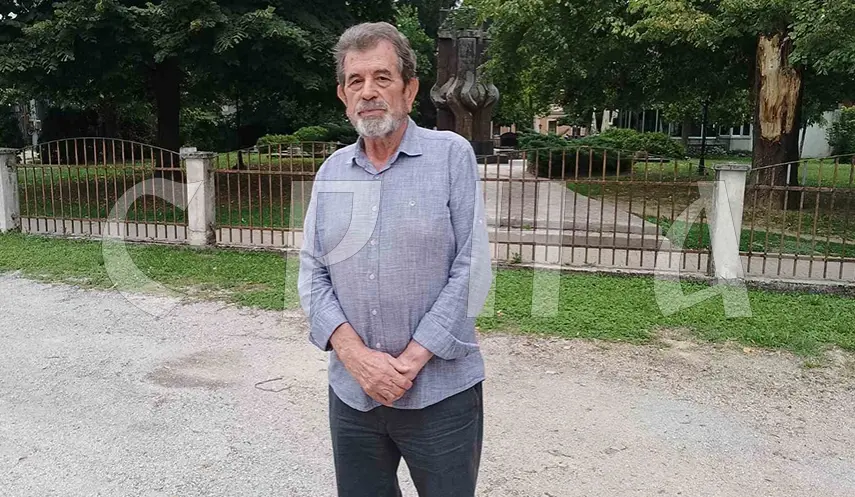ŠTRBAC: OUTCOME OF FEHIR'S TRIAL IN BELGRADE DEPENDS ON FILES FROM CROATIA
Croatia - war crimes
11/11/2025
13:37

BELGRADE, NOVEMBER 11 /SRNA/ - Savo Štrbac, Director of the Veritas Documentation and Information Center, told SRNA that the outcome of the trial in Belgrade of Krunoslav Fehir, accused of crimes against Serbs in Osijek, depends on whether the court accepts that the matter has already been adjudicated or whether the proceedings will continue with the imposition of a minimum sentence.
The trial of former Croatian soldier Fehir, accused of crimes against Serbian civilians in Osijek in the early 1990s, including organizing and inciting genocide and war crimes, is scheduled to begin tomorrow before the War Crimes Department in Belgrade.
Štrbac stated that Serbian judicial authorities have requested documentation from Croatia related to the case against Branimir Glavaš, who was convicted of crimes against Serbs in Osijek, in which Fehir was a protected key witness and acquitted, and added that if these documents are not provided, the court will most likely postpone the start of Fehir's trial.
According to him, if it is determined that the matter has already been adjudicated, the proceedings should be terminated and the accused acquitted. Otherwise, Fehir could face a minimum or suspended sentence, as he is charged with a so-called "privileged" form of war crime, for which the law prescribes the lightest penalty of one year.
Štrbac reminded that Croatian authorities had halted proceedings against Fehir, which could serve as a basis to stop the trial in Belgrade as well, since a person cannot be tried twice for the same matter, a universal legal principle.
"For the standard forms of the criminal offense of war crimes, penalties range from five to twenty years, while for this privileged case, the prescribed minimum sentence is one year," Štrbac said.
He emphasized that Fehir is considered a "positive" figure for Serbs, because without him, Glavaš's group and their crimes against Serbs would not have been exposed, and Glavaš would not have been tried in Croatia, while he is seen as a negative figure by the majority of Croats.
"As far as we at Veritas are concerned, and most of the Krajina Serbs I consulted, he is a positive figure for us because he exposed the atrocities committed against Serbs in Osijek. Although Fehir admitted everything and expressed remorse, it should be taken into account that he was a minor at the time, and what he revealed is more valuable than the harm he caused," Štrbac said.
He reminded that, based on Fehir's testimony, Glavaš was convicted in Croatia, although the verdict is not yet final, and sentenced to seven years.
"Fehir has long told everything and expressed remorse, and I do not expect that anything new will come out in this trial. He has repented," Štrbac said, adding that this proceeding does not send a good message to those in Croatia who might also have the courage to speak out about crimes against Serbs.
Štrbac reminded that Fehir is defending himself with the story he long ago told both journalists and Croatian judicial authorities: that he was a minor when he joined Glavaš's unit and when the incident occurred in which two Serbs were locked in a garage that served as Glavaš's headquarters, where they were tortured, and one of them, Čedomir Vučković, was forced to drink battery acid.
One of the Serbs, Vučković, ran out of the garage in agony, and Fehir, who was on guard, fired at him outside. However, later forensic examination during the trial of Glavaš and others in Croatia determined that Vučković died from the effects of the acid, not from Fehir's bullets.
At the beginning of August, the War Crimes Prosecutor's Office in Belgrade filed charges against Fehir, who was arrested on June 15 while entering Serbia as a taxi driver, his occupation after retiring from the police.
Krunoslav Fehir, as a minor, was a member of Branimir's Osijek unit, a unit directly subordinate to Branimir Glavaš, one of the founders of the Croatian Democratic Union /HDZ/ and at the time the most powerful figure in the Osijek area, in eastern Croatia.
He later testified at Glavaš's trial in Croatia as a protected witness, recounting the atrocities to which Serbs had been subjected.

SERBS IN TEARS AND FEAR OVER OWNERSHIP OF ORTHODOX CEMETERIES AND CHURCHES

CVIJANOVIĆ DEMANDS ACCOUNTABILITY FOR SHAMEFUL CONCERT IN ŠIROKI BRIJEG

OSTOJIĆ URGES BiH AND EU TO ACT OVER GLORIFICATION OF FASCIST IDEOLOGIES





